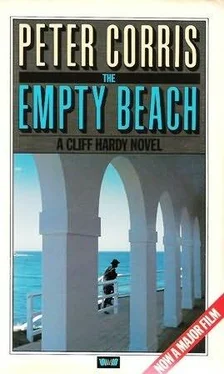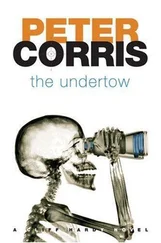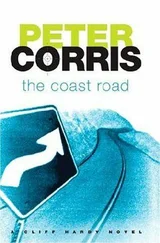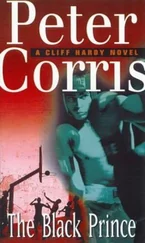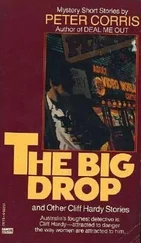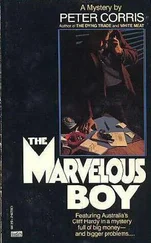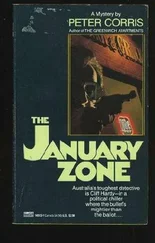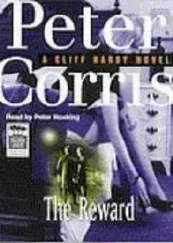Peter Corris - The Empty Beach
Здесь есть возможность читать онлайн «Peter Corris - The Empty Beach» весь текст электронной книги совершенно бесплатно (целиком полную версию без сокращений). В некоторых случаях можно слушать аудио, скачать через торрент в формате fb2 и присутствует краткое содержание. Жанр: Криминальный детектив, на английском языке. Описание произведения, (предисловие) а так же отзывы посетителей доступны на портале библиотеки ЛибКат.
- Название:The Empty Beach
- Автор:
- Жанр:
- Год:неизвестен
- ISBN:нет данных
- Рейтинг книги:3 / 5. Голосов: 1
-
Избранное:Добавить в избранное
- Отзывы:
-
Ваша оценка:
- 60
- 1
- 2
- 3
- 4
- 5
The Empty Beach: краткое содержание, описание и аннотация
Предлагаем к чтению аннотацию, описание, краткое содержание или предисловие (зависит от того, что написал сам автор книги «The Empty Beach»). Если вы не нашли необходимую информацию о книге — напишите в комментариях, мы постараемся отыскать её.
The Empty Beach — читать онлайн бесплатно полную книгу (весь текст) целиком
Ниже представлен текст книги, разбитый по страницам. Система сохранения места последней прочитанной страницы, позволяет с удобством читать онлайн бесплатно книгу «The Empty Beach», без необходимости каждый раз заново искать на чём Вы остановились. Поставьте закладку, и сможете в любой момент перейти на страницу, на которой закончили чтение.
Интервал:
Закладка:
‘Yes’, I said, ‘I want to go to the wake.’
11
There were a few extra lights burning in the boarding house, but no extra cars in the street. It wasn’t that sort of a party. I went through the security routine I’d developed for party-going many years before-wallet locked in the glove box, car keys tucked up underneath the vehicle, mad money folded small and wedged down in a pocket. Ann watched me incredulously.
‘Where’s your gun?’ she said.
‘In the car. Reckon I’ll need it?’
‘No. Got the grog?’
The front door was open and we walked down the passage towards the back of the house where I could hear soft, mournful music. The kitchen was crowded with men and women, and Mrs Jenkins sat at the table with those big, fat tears rolling down. Behind her a wizened-up monkey of a man was working his piano accordion and moaning out ‘Kevin Barry’. He was very drunk. The music was all right, but he hit and missed the notes like a housewife on Amateur Hour. Some of the others joined in when the words came back to them, but they weren’t much better.
I sat the bottles down on the sink, got two paper cups and poured two hefty whacks of the brandy. I handed one to Ann and when I turned back for mine the bottle had gone. I sipped the drink and studied the company. Mostly, the guests bore the marks of alcohol but not the broken veins of the whisky drinker or the gross bellies of the ten-schooner-a-day-folk. These were metho drinkers, eaten away to the bone by the stuff, or port people with their metabolisms shot to pieces by the rushes of alcohol and sugar. Half of them were thin, with the sugar-loaded blood of uncontrolled diabetics-they’d piss a lot and their noses would run from the colds they’d be a prey to and sex would be a distant memory. But tonight they were happy; tonight they were on plonk and beer and spirits and Leon’s death had given them a focus, a target for the emotions and energies which were usually concentrated on the next bottle.
I whispered to Ann, ‘Do you know any of these people?’
‘A few. See that woman in pink? How old do you think she is?’
‘Sixty?’
‘Forty.’
‘Jesus.’
I finished my brandy and a man leaning against the sink produced the bottle with a courtly flourish.
‘A refill, squire?’
‘Okay. Thanks’.
He poured me a judicious one and half-filled his own mug. He raised it.
‘Lucky Leon,’ he exclaimed.
‘Why do you say that?’
He dropped his head on his chest. His hand shook, but he was an expert at keeping fluid in a vessel held in a shaking hand. He was wearing cast-off clothes that were too big for him and heavy, broken shoes that had been expensive and stylish fifteen years before. He said something, but a burst of clapping at the end of a song drowned him out. I bent down to hear better and his smell almost floored me. He had it all, layers of body odour, urine and the rotten meat smell of decaying teeth.
‘A clean exit to a better world,’ he said.
‘Do you live here, Mr…?’
‘Montefiore. I have, not now. Are you making enquiries?’
‘God, is it that obvious? Yes, I am in a way, but I’m also here to pay my respects.’
‘You’ve done it.’ He held up the bottle. ‘Leon would have been pleased to know that such a quality beverage was being served at his wake.’
‘Did you know him well, Mr Montefiore?’
‘Edgar. Yes, quite well.’
I looked around the room. Ann was talking to the woman in pink, who was swaying on her chair. A great lock of red hair had fallen across her face and she was trying to push it back, but getting less interested. Mrs Jenkins had brought out a cigarette-rolling machine and Ann was making them. A few people around the table were watching with critical, greedy eyes.
I turned back to Edgar, who was filling his mug again. The high-quality beverage was getting to him because he was rocking slightly and his bloodshot eyes were glassy.
‘Edgar, do you happen to know what Leon had been doing the day he died?’
‘Doing?’ he slurred. ‘Didn’t do anything, old chap. Started off at the Haworth and went on from there.’
‘Where did he get the money?’
‘Pension cheque and… donations.’
‘Street donations, or did he knock on doors?’
‘Had a theory, Leon. Principle really-charity begins at home. Didn’t care too much for foreign relief in India, if you take my meaning. Used to call in where he saw signs of charity being dispensed and claim his share. Had a wonderful line of chat.’
‘You don’t know specifically where he went that day?’
‘No, sir. Saw him in the street in the afternoon.’ He tipped up his mug. ‘Do you know, I think he was very close to sober. Disgraceful, I said. Pale, he was, and shaking. Suppose he was sick. Suppose that’s how he fell. Negotiated those stairs myself many times, drunk as a lord, never fell.’
‘It could have been that,’ I said. But I was thinking of the ‘give’ poster outside the ashram and wondering what it took to make a confirmed drunkard sober in the late afternoon.
The booze was reaching the celebrants’ motor centres; the accordionist had put his instrument down and was sitting quietly, smoking one of Ann’s cigarettes. One man was slumped in a corner, snoring. The woman in pink stared fixedly at a paper cup in front of her and poured small amounts into it from the variety of bottles on the table. The front of Rose Jenkins’s dress was soaked with tears or wine or both; she was talking to Ann, who smiled and nodded in reply. A tall, thin man slid down against the wall and the beer bottle in his hand smashed on the cement floor. No-one took any notice.
Edgar held the brandy bottle up to the light and read from the label in a loud, stagey voice. ‘Product of Australia,’ he intoned. He closed his eyes as if great pain had gripped him. ‘Australia. God.’
I looked across and caught Ann’s eye. She nodded and patted Mrs Jenkins’s vast upper arm.
‘Thanks for coming, dear,’ the woman said mournfully.
We went towards the door, stepping over the man in the corner, who was sitting oblivious in a pool of beer. Halfway down the passage, a question occurred to me and I told Ann to wait while I hurried back to the kitchen. Rose had her nose in a cup of brandy that Edgar had given her; he was leaning over her and touching his fingertip to her ear in a parody of sexual play.
‘Mrs Jenkins,’ I said. ‘Were there any strangers in the house yesterday?’
‘Stranger?’
‘Yes; anyone wearing yellow, for example?’
‘White, did you say? No, yellow-no-one in yellow.’ She hiccoughed and wheezed.
‘Was there someone in white?’
She slurped the brandy. ‘Don’t remember. Go ‘way.’
Edgar Montefiore put his index finger with its black-rimmed nail into her ear. I went away. Back in the hall, Ann was pinned back against the wall by a big man with an Ulster accent who was haranguing her about Ireland. He wasn’t drunk or sober and he was pressing closer, making the attack physical as well as verbal. I put my hand on Ann’s shoulder and gently eased him back. I had an elbow ready for his ribs if he turned nasty, but he said something uncomplimentary about Protestants and moved off towards the grog.
The encounter upset Ann more than I’d have expected. She was pale and the shoulder muscles under my hand were knotted and tense as we went out to the street.
‘I hate that,’ she said fiercely.
‘What?’
‘Needing to have a man around to rescue me.’
There was nothing to say to that-chivalry is chauvinism, protection is paternalism. She was five foot ten and weighed ten stone; with tae kwon do, she’d be a terror on the mat. But tae kwon do is no good if you’re upset and, like it or not, that’s how most women react to a physical threat. I’ve talked it over with them, especially Hilde, and they argue that male violence makes them react that way. So they win the argument and still lose the fight. I took my hand away.
Читать дальшеИнтервал:
Закладка:
Похожие книги на «The Empty Beach»
Представляем Вашему вниманию похожие книги на «The Empty Beach» списком для выбора. Мы отобрали схожую по названию и смыслу литературу в надежде предоставить читателям больше вариантов отыскать новые, интересные, ещё непрочитанные произведения.
Обсуждение, отзывы о книге «The Empty Beach» и просто собственные мнения читателей. Оставьте ваши комментарии, напишите, что Вы думаете о произведении, его смысле или главных героях. Укажите что конкретно понравилось, а что нет, и почему Вы так считаете.
